Iran Spokesman: Nuclear Policy Set By National Security Council
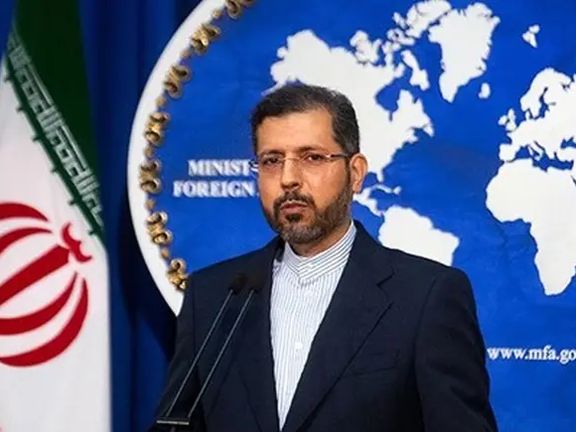
After parliament Sunday passed a motion setting conditions for reviving the 2015 nuclear deal, Iran’s foreign ministry made clear where decisions were taken.
Iran International

After parliament Sunday passed a motion setting conditions for reviving the 2015 nuclear deal, Iran’s foreign ministry made clear where decisions were taken.
"The Supreme National Security Council is responsible for managing the talks in Vienna," Saeed Khatibzadeh told his weekly press conference in Tehran Monday. "We have heard the voices of the people's representatives both in private and in public. The government has made every effort, and will continue to do so to act within the framework of their implementational and feasible views.”
The Supreme National Security Council (SNSC) – which has 23 members, including the president, chief justice, various ministers and military commanders − sets security policy, including Iran’s approach to nuclear talks.
Since the 2020 parliamentary election, a majority of parliament oppose, or at least are skeptical about the 2015 deal, the JCPOA (Joint Comprehensive Plan of Action), and last year passed legislation requiring a scaling up of the nuclear program.
On Sunday, 250 out of the 290 parliamentarians voted for a motion referring to red lines Iran should not breach, including sanctions “imposed on the country under numerous pretexts, including nuclear activity, missile development, and human rights violations.” The motion said that the United States and skeptical the three European JCPOA signatories should lift sanctions imposed under Countering America's Adversaries Through Sanctions Act (CAATSA), the CAATSA U-turn, and the Iran Sanctions Act (ISA).
Khatibzadeh reiterated that talks in Vienna aiming to revive the 2015 accord would continue within JCPOA structures and that Iran would not enter direct bilateral talks with the US. He pointed out that the previous administration of Donald Trump, like the current administration of President Joe Biden, had sought direct talks. "Today we exchange non-papers with the US indirectly,” the spokesman noted. “They can't expect to see different outcomes when their policies are the same."
In a tweet Monday, Ali Shamkhani concurred. "Negotiation with US is not on the agenda of Iranian team because it will not be the source of any progress," he wrote.
A few weeks ago, Shamkhani and foreign minister Amir-Abdollahian both said that direct talks with the US were possible. This prompted criticism from, among others, editor of Kayhan newspaper Hossein Shariatmadari, a veteran opponent of nuclear talks, the JCPOA, and past bilateral talks with the US over Iraq, Afghanistan and the nuclear program.
Opponents of the JCPOA, like their counterparts in the US, have been increasingly vocal in past weeks as the Vienna talks reportedly made progress.
In a report published by Iran Diplomacy website January 26, conservative commentator Jalal Khoshchehreh said Iran had softened over direct talks with Washington following President Ebrahim Raisi's visit to Moscow. Raisi himself, however, implied on live TV January 25 that such talks are possible only if the US first lifted ‘maximum pressure’ sanctions.
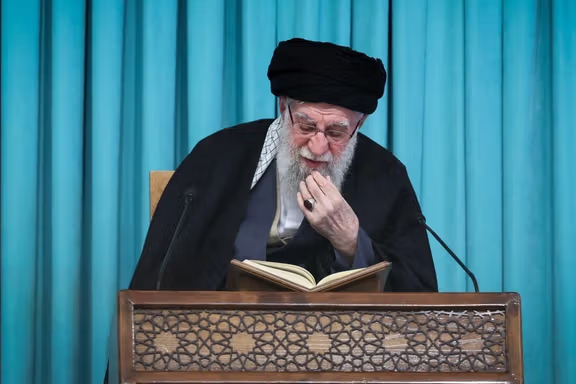
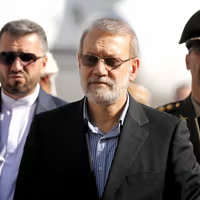
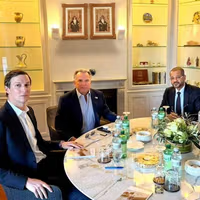

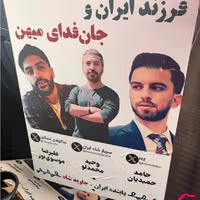
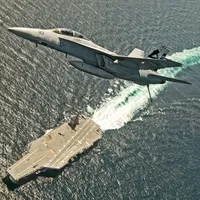
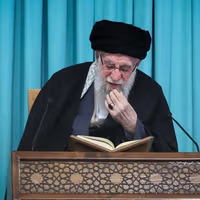
Israel will address its misgivings about an emerging new Iran nuclear deal in future bilateral arrangements with the United States, an official said on Monday.
Israel, which is not a party to nuclear negotiations between Iran and world powers in Vienna, has voiced concern that they could produce a revived deal that "create(s) a more violent, more volatile Middle East".
Transportation Minister Merav Michaeli, a member of Israel's decision-making security cabinet, said that as a center-left opposition lawmaker in 2015 she had supported the then-nuclear deal with Iran - which the Trump administration later withdrew from.
But, she said, "this (emerging) deal is much shorter, with many more sunsets, with many, many more - I would say - bad opportunities, cracks. And yes, it's very, very problematic".
"So we are doing whatever we can to make it as best as possible," Michaeli, speaking in English, told the Conference of Presidents of Major Jewish Organizations in Jerusalem.
"We will have to work on a complementary agreement between Israel and the US"
She did not elaborate. Israeli leaders have previously asserted that their country would not be bound by any nuclear deal and could take unilateral military action against their arch-foe if they believed it was required to deny it nuclear weapons. Iran denies seeking such weapons.
Reuters Report
Behnam Ben Taleblu and Saeed Ghasseminejad analyze Iran's nuclear options as US-Iran talks to revive the 2015 agreement, JCPOA reach a critical stage in Vienna.
-----------------------------------------------------------------------------------------------------------------------------
Opinion-Analysis
US officials have deployed an impressive array of metaphors over the past 10 months – from dwindling patience, to a diminishing runway, to a closing window – to describe the Biden administration’s appetite for indirect diplomacy with the Islamic Republic of Iran. As of early 2022, some of these officials conceded that there was only “a handful of weeks” left to restore the 2015 Iran nuclear deal known as the Joint Comprehensive Plan of Action (JCPOA), after which, Washington might have to consider other options. America’s diplomatic partners have recently downgraded that timeline to mere days.
Leaving aside whether the US is serious about the inflection point at hand or if a deal is as close as some diplomats allege, American policymakers should be taking stock of the costs and benefits driving Iranian decision-makers this late in the game. As the famous Chinese military strategist Sun Tzu said, “If you know yourself but not the enemy, for every victory gained you will also suffer a defeat.” Guarding against defeat requires understanding the push and pull pertaining to every option for Iran.
From what can be inferred, there are at least three paths ahead for Tehran: pressing for a considerably lesser or interim agreement like that which was achieved in 2013, agreeing to restore compliance withthe fast-expiring 2015 deal, or continuing to overtly escalate towards at least a threshold nuclear weapons capability. Any of these decisions will be framed as securing the survival of the regime, which is code for aiming to blunt the chances of an external attack or internal unrest. Regardless of Tehran’s choice, the Iranian nuclear challenge is only set to intensify.
A more limited agreement
The first option, that of a considerably narrower diplomatic arrangement than the JCPOA, could be possible should continuing nuclear expansion coupled with Iranian intransigence in Vienna drive the US well beyond its self-imposed deadline for a deal. Through a deliberate though temporary strategy of nuclear escalation, Iran may opt to continue raising the costs of seeking the sort of cap found in the JCPOA while remaining in Vienna to instead force the US to settle for a lesser agreement like the 2013 Joint Plan of Action (JPOA).
The JPOA followed a historic phone call between the US and Iranian presidents on the sidelines of the UN General Assembly in September 2013, as well as a blessing of diplomacy by Iran’s Supreme Leader Ali Khamenei under the guise of showing “heroic flexibility” that same month. The Obama administration used the JPOA to trade away select US sanctions for a limited Iranian nuclear freeze, reversing decades of US nonproliferation policy by permitting low-level enrichment of uranium by Tehran.
While Iran’s Foreign Ministry spokesperson routinely denies that Tehran has any interest in an interim agreement, Vahid Jalalzadeh, who leads the country’s national security and foreign policy committee in Parliament, claimed that Iran would not reject the idea of an interim deal out of hand.
Should Iran angle for a JPOA-type agreement, a number of factors may make it an easier sell for Washington to accept. To begin with, the Biden administration has already climbed down from seeking a broader agreement than the JCPOA. Tehran could be forgiven for thinking that Washington can be pressured to again settle for less and narrow the goalposts.
More importantly, several high-ranking members of the Biden administration were intimately involved in the Obama-era diplomatic backchannel that led to the JPOA. Their presence at the political helm again may suggest a certain level of receptivity to striking another interim agreement based on logic inherited from the previous Democratic administration. Such receptivity has already made news. In November 2021, prior to the commencement of nuclear talks with Iran's new government, US National Security Advisor Jake Sullivan reportedly suggested the idea of an interim nuclear deal to Israel. In early 2022, the administration was reportedly privy to a Russian offer of an interim-type deal to Iran. And according to an allegation by Jalalzadeh, the US already tried to offer Iran an interim arrangement.
An interim agreement would yield Tehran a mixed bag of perceived and real benefits. Despite recent comments by Israel’s Prime Minister about retaining “freedom of action in any case, with or without an agreement,” Iranian decision-makers may see even the most modest of nuclear agreements, like a JPOA option, as politically complicating any potential Israeli strike on their nuclear facilities. This is particularly the case in the short-term after an agreement is agreed to and implemented by the same US administration which negotiated it.
Materially, in addition to leaving a large portion of Iran’s nuclear program intact that would enable Tehran the option of rapid expansion at a time of its own choosing – call it Iran’s nuclear snapback – while an interim agreement would provide limited financial relief. Economically, a JPOA-type agreement is likely to use enhanced trade to triage rather than resolve the sanctions-related issues plaguing Iran’s economy. While the reversal of pressure is also likely to improve Iran’s GDP and boost its currency, an interim deal would not fully restore market access. A JPOA-deal would likely bolster trade with select sectors the Islamic Republic has already heavily invested in and diversified to survive maximum pressure sanctions, such as petrochemicals and non-oil products. Modest relief might be sufficient to allow Iranian President Ebrahim Raisi to deliver on some of his economic pledges and other policies.
Another vector of interest to Tehran under a JPOA-scenario is access to its frozen oil funds abroad and the ability to export oil more freely. Under the JPOA, Iran was able to again ramp up oil exports to customers in East Asia as well as gain access to frozen oil funds. Tehran has been striving to access these funds through intimidation and lawfare against jurisdictions like South Korea which currently holds a reported $7 billion of frozen Iranian oil revenues due to compliance with US sanctions. Access to frozen funds would offer Tehran a chance to double-down in the region through support to its regional proxy network which faced significant financial shortages when their patron was under ‘maximum pressure’ sanctions.
While Washington has only occasionally spoken about the possibility of something other than diplomacy to address the mounting Iranian nuclear challenge, Tehran is nonetheless predicting increasing oil exports soon. According to data from the latest Iranian budget, Tehran is aiming to export an average of 1.4 million barrels per day in the Iranian calendar year 1401 (March 2021 – March 2022) at an estimated value of 70 dollars per barrel. According to the U.S. Energy Information Agency, Iran averaged about 1.4 million barrels of crude oil and condensate exports when the JPOA was in effect in 2014. Already, without an agreement and due to unenforced sanctions, Iran has exported over one million barrels per day in 2022, which is on par with where the JPOA sought to cap Iran’s crude oil exports. Iranian oil and banking experts have reportedly already travelled to Seoul, likely in anticipation of some sort of diplomatic agreement that would bring more Iranian oil back online.
Given the anti-JCPOA constituents in and conflicting JCPOA messaging from the ultra-hardline Raisi government, attaining an interim deal would need to be domestically sold as meeting national needs without having had to settle for an agreement hardliners have long attacked. The reason for the political tightrope is simple: a JPOA-type deal would by default provide less financial relief than what Raisi’s predecessor President Hassan Rouhani attained at the negotiating table in 2015, as well as what Rouhani’s team claimed was on offer from the US in indirect talks in 2021. As reported to the Iranian Parliament by the Foreign Ministry, these negotiating wins allegedly included a rollback of much of the Trump-era sanctions architecture to include the Foreign Terrorist Organization designation of the Islamic Revolutionary Guard Corps (IRGC) as well as removal of an executive order targeting the Supreme Leader’s network of appointees, which includes President Raisi himself. Depending on the content of an interim deal, Raisi and his negotiating team would have to sell a less-favorable economic outcome as being worth retaining more of Iran’s nuclear program.
However, trading away even a fraction of Iran’s recent nuclear gains like enrichment of uranium to 60 percent purity or use of advanced centrifuges for an oil market access rate Tehran is able to achieve at present without an agreement is likely to be criticized. As would a failure to secure some sort of insurance or promise – which is one of three things Raisi claims Iran seeks in nuclear talks – against a likely change in the US position on the deal if President Biden is replaced by a Republican in 2025.
Tehran’s adherence to JCPOA - or JCPOA lite
This brings Tehran to its second option, resuming adherence to the JCPOA. Iran is unlikely to reset the pieces of the nuclear chessboard exactly back to January 2016 when the deal entered its implementation phase. Iranian officials have made clear that they will not negotiate beyond the JCPOA, meaning they would not agree to add to or amend the JCPOA to extend its sunset clauses or add greater restrictions to offset the time Tehran began to violate the accord. The same may hold true for a restoration of the much touted one-year breakout time – no matter how problematic it originally may have been to calculate. Tehran is much more likely to cite US concerns surrounding shrinking breakout or lapsing sunsets as the cost of Washington’s decision to leave the deal in 2018. Put differently, the JCPOA “buys” much less time in 2022 than it did in 2015. This is a message the Biden administration appears willing to amplify given reports of a “blame Trump” political messaging strategy already in place.
Should Tehran reestablish adherence to the JCPOA without successfully amending its sunset provisions, Washington’s multilateral sanctions snapback option– which reverses the veto mechanism at the UN Security Council and allows a single permanent member to collapse the JCPOA and its accompanying resolution – will terminate in 2025. Getting rid of the threat of snapback would be a huge political win for Tehran, locking in the deal at least at the UN level. Coupling Iranian resistance to amending the JCPOA and new nuclear moves that have provided the regime with “irreversible” knowledge about high-level enrichment, uranium metal production, and advanced centrifuge operation, resuming compliance with the JCPOA will mean enacting a weaker deal, colloquially termed a “JCPOA minus.” Domestically, Raisi and his negotiating team could sell this as having forced Washington to “pay” Iran for pulling out of the deal in 2018.
A JCPOA minus scenario would be brought about by the same force which is barreling down on the Biden administration today: continuing nuclear escalation. Specifically, the greater the scale and scope of nuclear escalation, the sharper the choice facing the Biden administration between reverting to pressure or conceding to Tehran to attain a pause. Given the number of foreign policy crises the administration must contend with, its entirely plausible that Tehran would continue short-term nuclear expansion to ensure it’s agreeing to a JCPOA minus is interpreted as a de-escalatory move. This would allow Washington to sell the accord as more than the freeze found in the JPOA and as providing breathing room to pivot to address other foreign policy matters.
Iran’s willingness to re-entertain temporary caps imposed on parts of its atomic program found in the JCPOA stem from the prospect of not only offsetting any lingering sanctions effects, but a desire to maximize any dividends the deal offers, and as quickly as possible. One rationale would be to hedge against the potential for a change in US-Iran policy post-2025. Enhanced market access that leads to an ability to buy and sell goods and services more freely, to at least double Tehran’s oil export revenues, add to non-oil export earnings, grow Iran’s economy, and reduce its cost of imports by almost a quarter, will all help with curbing inflation. But strategically, these moves could provide Iran with sufficient financial insulation to rapidly expand its nuclear infrastructure in another potential race against American sanctions after 2025. Being able to hedge against another rapid oscillation in US policy is a critical factor in any Iranian agreement to bring back the JCPOA.
The JCPOA would provide ailing Iran a myriad of other economic dividends. Attachments to the original 2015 deal included hundreds of sanctioned banks, businesses, persons and even vessels scheduled for delisting. In addition to again working towards the removal of those entities from US and EU sanctions lists, returning to the deal would also mean waiving the most stringent US sanctions to include those against the sale, supply, transfer, insurance, and potentially even storage of Iranian oil should the US broadly define all Trump-era sanctions as being “inconsistent” with the JCPOA. Expanding on the JPOA, the JCPOA would pave the way to reconnect Iran to the international financial system and restore sanctioned Iranian banks to the SWIFT financial messaging system. While Western firms might still be hesitant to invest in Iran until after 2025, a JCPOA would offer more risk-tolerant Chinese firms sufficient cover and a beachhead to act on a 25-year strategic agreement which was reached in 2021 and implemented this year. The accord, which is mostly economic and political, builds on warming military ties between Tehran and Beijing.
Iranian officials may also welcome a JCPOA minus deal if it leads to not enforcing or even waiving existing non-nuclear sanctions, such as those against the Islamic Republic’s terrorism and missile networks. The same holds true for entities that could stand to receive sanctions relief without earning it by changing their behavior, like the Central Bank of Iran (CBI). The CBI was sanctioned prior to the advent of JCPOA but was re-sanctioned in 2019 for its support of terrorism. The ability to underwrite terrorism as well as develop a robust long-range strike capability are critical elements of Tehran’s foreign and security policy. A conciliatory approach in the face of these threats may be a proxy for Washington agreeing to also pull its punches on other non-nuclear issues such as human rights, or pushback against Iran-backed groups contributing to humanitarian catastrophes and civil wars in conflict theaters such as Syria and Yemen. If past is prologue, a nuclear deal will make America less likely, not more likely, to contest Iran and its proxy-related aggression in the Middle East.
This is not to say that resuming adherence to the JCPOA will be without its challenges or hiccups for Iran. One might assume that these challenges will be technical, such as making Iran’s nuclear snapback option harder given the greater (albeit temporary) restrictions found in the JCPOA when compared to the JPOA. But nuclear advances over the past year and half – which European and American officials admit reduce the utility of an agreement like the JCPOA – placate this concern for Iranian decisionmakers. What’s more, Iran’s experience with incremental nuclear escalation since 2019 may have even taught the regime how best to exercise its snapback in a future crisis-bargaining scenario.
Instead, the greatest costs are likely to be political, and of the domestic variety. The Raisi government will have a harder time managing the politics of JCPOA re-entry than Iran’s ultimate decider, Supreme Leader Ali Khamenei, who has often deflected blame unto past Iranian presidents for shortcomings of policies he supported. Khamenei has been able to do this through a delicate balance of statements whereby he stresses the untrustworthiness of America and its allies, tacitly and broadly supports the idea of negotiations – he differentiated between negotiations and submission just this January – while criticizing the approach of the Rouhani government towards the JCPOA from 2015-2016, claiming just this February that his “points were not heeded and later problems emerged.”
The domestic bludgeoning of Rouhani using the JCPOA occurred despite the fact that Khamenei ran political cover for Iranian negotiators multiple times in 2015, leading one analyst to call him “the guardian angel of Iran’s nuclear negotiators.” Should a JCPOA minus be attained but implementation problems emerge, Raisi can at best expect the same noncommittal attitude that Khamenei offered a framework agreement from April 2015 that led to the JCPOA. “I neither agree nor disagree,” he said.
Raisi can almost certainly be expected to pay some sort of political price for going back to a deal that has for so long been the target of influential ultra-hardline voices. While these voices are aware of Khamenei’s overt support for nuclear negotiations, accountability in Iran’s revolutionary system is an altogether different matter. This past December for example, the editor in chief of Tehran’s hardline daily Kayhan newspaper, who is close to Khamenei, criticized the Raisi government’s negotiating team for accepting talks that would not address or remove America’s non-nuclear sanctions.
More damningly, former nuclear negotiator and presidential candidate Saeed Jalili recently confirmed that six months ago he penned a lengthy private letter to Khamenei advising a course correction to Iran’s nuclear negotiating strategy. His advice reportedly included enriching uranium to weapons-grade, then entering bilateral talks with the US to resolve all sanctions matters. The increasing anti-JCPOA vitriol by individuals more radical than Raisi – which itself is no easy feat – does not bode well for him, who Iran Watchers assess as being a likely contender to succeed Khamenei as the next Supreme Leader. A cleric like Raisi with no constituency who supported JCPOA reentry would be an easy target for other power centers in a post-Khamenei Iran, be they elements of the IRGC or other rumored contenders like Khamenei’s son, Mojtaba.
Becoming a nuclear threshold power
The political saliency of the anti-JCPOA messages espoused by Jalili – who was also an ardent critic of the original 2015 deal – along with Khamenei’s impression of American irresolution as recently seen in the botched Afghanistan withdrawal or lax sanctions enforcement in the face of mounting Iranian nuclear violations, may well push Tehran towards a third option. Continued and overt escalation that leads Iran to becoming a potential nuclear threshold power or even towards developing and potentially testing a weapon. To be clear, Iran can still attain a threshold capability even if the JCPOA minus option is agreed to. This is why any accord with Iran based on the pillars of the JCPOA would at best be a Faustian Bargain. However, there are differences between a hubris driven and risk-tolerant quest for the bomb by Iran and a patience driven and risk-averse one.
Becoming a nuclear power would be a game-changing achievement for the Islamic Republic, but most importantly for Khamenei, who is in the ninth decade of his life and fourth decade of his career as Iran’s most powerful person. Khamenei may feel tempted to put into practice an adage from the founding father of the Islamic Republic, Ayatollah Ruhollah Khomeini, who said, “the Iranian nation must grow in power and resolution until it has vouchsafed Islam to the entire world.” At this stage in his life, Khamenei may believe that developing or being a screwdriver turn-away from the ultimate weapon would provide his regime with the ultimate deterrent, and thus the only way to safeguard the Islamic Republic after his death. The honor of overcoming decades of US counterproliferation efforts enroute to possessing the first “Shiite bomb” in the Muslim world would also be no small legacy to bequeath.
At home, Khamenei’s worldview, success in playing power centers off of one another, and using presidential “election” cycles to narrow the political spectrum provides him with a sense of invincibility. Coupled with the brutality Iranian security forces and thugs have wrought against waves of popular protest in recent years, along with Iran “outlasting” Trump-era sanctions, Khamenei may soon feel that a deal with the “great Satan” is no longer needed to avoid internal rebellion, and that patience in the face of perceived American weakness and Iranian strength could be counterproductive.
This would be on par with an evolution already underway in Iranian foreign and security policy. Khamenei has outlived other Middle Eastern autocrats and is emboldened by the success of Iran’s asymmetric strategy employed in theaters like Iraq, Syria, Lebanon, and Yemen to adjudicate political and military disputes through a network of terrorists, agents, and affiliates that the IRGC has created or cultivated over the past four decades.
Traditionally, proxies served to mask Iran’s hand in conflict, but they are increasingly becoming an Iranian calling-card. This makes the issue not one of attribution by an adversary after a drone, rocket, cruise missile, or ballistic missile attack by Iran or one of its cut-outs, but the political will to respond. With political will already in short supply, by getting the bomb the Islamic Republic is hoping to force further accommodation in the region while turning up existential angst in Israel.
While aggression and overreach has lost the Islamic Republic nearly all of its soft-power and ecumenical appeal, Tehran’s foreign policy successes– which often capitalize on mistakes made by its regional adversaries or vacuums left by the U.S. – have come through the employment of military power and terrorist organizations and read as a model worth supporting and promulgating. Tehran might gamble that developing the bomb under duress would allow Iran to win back some of its lost clout without having to downgrade its hard power approach.
Such benefits would also be shared with Raisi, as the Islamic Republic would be seen as going nuclear on his watch, which in turn could help his succession chances. Similarly, the bomb will increase the stature of the already formidable IRGC, who were involved in past weapons efforts and serve as custodians of Iran’s ballistic missile arsenal – the largest in the Middle East – which is the likeliest way Tehran may threaten to use these weapons. In the Middle East today, conventionally armed and increasingly precise ballistic missiles are increasingly used in military operations by Iran. The Guard Corps could use that record and potentially leverage a threshold capability in future crises to extract a broad range of coercive, punitive, and deterrent dividends, as they have with their missile program.
To be clear, Iran continues to promulgate the fiction that its nuclear program is purely peaceful, despite the fact that it was resurrected amid a bloody eight-year war with neighboring Iraq in the 1980s and that a 2018 Israeli raid exposed Iran’s secret atomic archive where it retained critical documentation of past weaponization efforts. This is because at least in the interim, Tehran assumes that a dash to a bomb using overt facilities or being the prime mover in another race between sanctions and centrifuges is not a winning strategy and will likely invite Israeli kinetic pushback and at least more stringent American economic pressure. Coupling the potency of a military deterrent with the fear of prolonged isolation and economic deterioration best explains why Iran hasn’t already opted to go down this route. The converse of leaving a nuclear bomb as a legacy to secure the Islamic Republic would be attempting to dash to the bomb, getting caught, and triggering a conflict that invites the Islamic Republic’s ruin.
Accordingly, Khamenei may not want to junk three decades of caution just yet, but American denigrationof maximum pressure sanctions – as Biden administration officials have done – could help get Tehran there, and soon. After all, it’s not every day that Khamenei is able to counter US policy by merely reciting State Department talking points about the alleged failure of US sanctions. Raisi was not far behind in pointing this out as well.
Time will ultimately tell if the regime embraces sustained escalation instead of opting for another temporary and flawed deal. All three of which, after all, keep Tehran on the path to a nuclear weapons option. Iranian officials have occasionally broached the topic of nuclear weapons development in their political commentary. Last year for example, the country’s Intelligence Minister likened Iran to a “cornered cat,” and insinuated that if Iran’s back was against the wall, it might “behave differently from when the cat is free.” If Iran goes nuclear, policymakers could one day look back on that comment as Tehran preparing the ground to advance its program by alleging it was under fire.
One thing is abundantly clear, however. No matter the litany of comments about how much time is left on the clock for diplomacy, Iran is doing and saying all it can to remind the international community that it remains in the driver’s seat of its nuclear program. As Khamenei said months before reaching the JCPOA in 2015, “They might say that we only have three months to reach a deal, well if three months becomes four months the sky won’t come falling down.”
Behnam Ben Taleblu is senior fellow at the Foundation for Defense of Democracies (FDD), where Saeed Ghasseminejad is a senior advisor. They both contribute to FDD’s Iran Program, Center on Economic and Financial Power (CEFP), and Center on Military and Political Power (CMPP). The views and analysis expressed are their own.
Opinions expressed by the authrors are not necessarily the views of Iran International
Israel’s Defense Minister Benny Gantz has warned that even if a nuclear deal is signed, Iran must be stopped from being a nuclear threshold state.
Gantz said on Sunday that “All steps must be taken to ensure that Iran never becomes a nuclear-threshold state. The world must never come to terms with it and Israel will never come to terms with it.”
He also issued a warning to Tehran’s top proxy, the Lebanese Hezbollah, saying Israel will retaliate against any provocative moves.
Earlier in the day, Prime Minister Naftali Bennett said Israel will maintain its citizens’ security, while “organizing and preparing for the day after, in all ways, so that we can maintain the security of the citizens of Israel on our own”, adding that the Islamic Republic “will use financial gain from the deal to fund regional terror”.
He described the new deal as “shorter and weaker” than the previous agreement, which would allow Tehran to build “stadiums of advanced centrifuges without restrictions” once the deal lapses in two and a half years if it is signed without an extension of the original JCPOA expiration date.
“Two things have happened since the original signing — the Iranians have made great strides in building their enrichment capabilities, and time has passed”, he said, adding, “This terrorism endangers us, endangers other countries in the region, and as we have seen recently, will also endanger American forces in the region”.
A large majority in Iran's parliament issued a statement urging President Ebrahim Raisi not to agree to any new nuclear deal without ensuring Iran's demands.
In the Sunday statement signed by 250 lawmakers, out of 290, stressed that getting credible guarantees is a red line to ensure the interests of the Iranian people is protected. Hardliners loyal to Iran’s Supreme Leader Ali Khamenei dominate the Iranian parliament since 2020, after elections in which most rivals were banned from contesting.
Iran has been insisting to obtain a political guarantee from the United States that it would not renege on a new nuclear agreement. Former president Donald Trump unilaterally withdrew from the Joint Comprehensive Plan of Action (JCPOA) in 2018, reimposing crippling sanctions on Tehran.
However, the Biden Administration cannot guarantee that a future president or Congress will not reimpose sanctions.
Lawmakers said the negotiations to revive the 2015 deal have reached a critical point, calling on the president not to compromise on any of the demands reiterated by the Islamic Republic. These include not only a political guarantee, but also the removal of all sanctions imposed on Iran, whether for nuclear or other reasons, such as human rights violations or terrorism. The text explicitly mentions guarantees by France, Germany and the United Kingdom, the three European signatories of JCPOA, to remove all sanctions.
The statement said the US and the three European signatories of the nuclear deal have shown in the past eight years that they are not committed to any agreement and used all the possible means against the interests of the Iranian people, adding that they also put sanctions on medicines – a highly questionable claim.
The lawmakers also asked Raisi to get credible will not use JCPOA’s trigger mechanism designed to reimpose international sanctions in case Iran violates the nuclear agreement.
According to the statement, the US and the three European countries must lift all the sanctions related to nuclear, terrorism, missiles, and human rights issues, including the Countering America's Adversaries Through Sanctions Act (CAATSA), CAATSA U-turn, and the Iran Sanctions Act (ISA).
The US and JCPOA signatories must fulfill their obligations about sanctions in a manner verifiable for Iran, they said, noting that the administration should brief the parliament on the removal of oil and banking sanctions, then the parliament would approve reducing the nuclear activities.
Western and Russian diplomats and the US State Department in recent days have said that the Vienna talks have made significant progress, and some have said a final agreement is imminent until the end of February.
Although the parliament’s move could be a negotiating ploy by Tehran, but it indicates a final deal in Vienna can be harder than what Western sources have indicated.
Iran's president and foreign minister have reiterated that for an agreement in nuclear talks Washington must remove all sanctions and guarantee the deal.
In a phone conversation with his French counterpart Emmanuel Macron on Saturday, the Iranian President Ebrahim Raisi reiterated that any deal for the restoration of the deal, Joint Comprehensive Plan of Action (JCPOA), must include the lifting of sanctions, convincing guarantees that Washington will not renege on the deal in the future as former US President Donald Trump did in 2018, and "an end to political issues and claims".
In his hour and half-long phone talk with Macron, Raisi also said Iran is under certain "political pressures or claims aimed at maintaining the leverage of pressure" that "undermine the prospect of reaching an agreement in Vienna".
It is not clear what pressures Raisi was referring to, but Iran has made advances in its nuclear program that must be addressed by any agreement if JCPOA is to be restored. One issue is advanced uranium enrichment machines it has deployed since 2020 and the stockpile of highly enriched uranium these centrifuges have produced. Beyond nuclear issues, the US is demanding the release of American and possibly other Western citizens held in Iran on trumped-up charges, Iran’s ballistic missiles and its aggressive regional policies.
"President Macron stressed the need to conclude an agreement while there was still time for this. He also expressed his conviction that the discussions, which are being conducted with the active participation of France and its partners, make it possible to arrive at a solution that takes into account the fundamental interests of all parties,” the Elysee Palace said in a short communiqué according to France 24. “This would help avoid a major nuclear crisis,” the statement said.
“What we are considering seems absolutely reasonable and fair: the removal of all sanctions inconsistent with the JCPOA, verification of sanctions removal, and presentation of absolutely necessary objective guarantees for the fulfilment of commitments,” Foreign Minister Hossein Amir-Abdollahian said in an address at the Munich Security Conference Saturday evening and added that Western powers will be responsible if the nuclear talks in Vienna fail because Tehran wants "a good deal".
Iran's Supreme Leader Ali Khamenei on Thursday accused Western powers of seeking to deprive Iranians of peaceful nuclear energy and reiterated that Iran has never sought nuclear weapons but gave no indication in his speech as to whether he thought a revived deal, restoring limits on Tehran’s nuclear program, was likely.
‘Tangible good will’
Amir-Abdollahian also reiterated that Tehran wants the US to show “tangible steps of goodwill," in a possible reference to freeing Iran's blocked funds abroad.
When asked about prospects of direct negotiations between Tehran and Washington at a panel at the Munich Security Conference Saturday, the Iranian foreign minister did not rule out the possibility but said Washington should show tangible goodwill gestures including the release of Iran's assets frozen in other countries under the US sanctions before even considering to directly negotiate with the US in Vienna.
European powers have in the past few days warned that time for reaching an agreement with Tehran was quickly drawing to an end, but Tehran continues to blame the other parties and says the deadlines set by them are "fake".
Iran's Foreign Ministry spokesman Saeed Khatibzadeh said Saturday that Tehran has already made its "serious decisions" and demonstrated its seriousness all along during the talks. "To reach the final agreement, it is now up to the E3 and the US to do the same, urgently," he tweeted.
Amir-Abdollahian on Saturday also said Tehran is ready for an "immediate" prisoner swap with the US. “We believe prisoner swap is a humanitarian issue ... unrelated to the nuclear accord. We can do it immediately,” he told the panel at the Munich Security Conference.
Tehran has refuted a Reuters report Friday that claimed a prisoner swap was part of the talks.
Tehran is holding at least four Iranian-American nationals as well as several with citizenship of European countries including France, Britain, Germany, and Sweden who were arrested by the Revolutionary Guards (IRGC) and sentenced by Revolutionary Courts to prison terms.
The US Special Envoy for Iran Robert Malley said on January 24 that a nuclear agreement with Tehran was unlikely without the release of Americans detained in Iran.